| Srl | Item |
| 1 |
ID:
145198
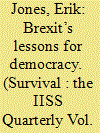

|
|
|
|
|
| Summary/Abstract |
Regardless of the result, the British referendum on European Union membership is a watershed moment. The campaign has already taught us important lessons about direct democracy, European integration and political communication. ‘Europe’ has changed as a consequence. The referendum may turn out to be a salutary experience; it may also set a destabilising precedent. We may nevertheless be wiser coming out of the process – at least in certain respects – than we were going into it.
|
|
|
|
|
|
|
|
|
|
|
|
|
|
|
|
| 2 |
ID:
156298
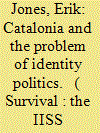

|
|
|
|
|
| Summary/Abstract |
The 1 October Catalan referendum on independence was a trap for Madrid. Spain’s political leaders were bound to be criticised whether they ignored the vote or tried to stop it. Shunting responsibility for dealing with the crisis onto the courts and the police was no way out. The voters in Catalonia know that. Now the Spanish government will be held to account. Political leaders everywhere should pay attention.
|
|
|
|
|
|
|
|
|
|
|
|
|
|
|
|
| 3 |
ID:
071354
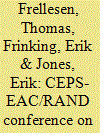

|
|
|
|
|
| Publication |
Santa Monica, Rand Corporation, 1993.
|
| Description |
iii, 52p.
|
|
|
|
|
|
|
|
|
|
|
|
Copies: C:1/I:0,R:0,Q:0
Circulation
| Accession# | Call# | Current Location | Status | Policy | Location |
| 035217 | 327.4073/FRE 035217 | Main | On Shelf | General | |
|
|
|
|
| 4 |
ID:
143023
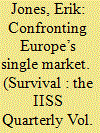

|
|
|
|
|
| Summary/Abstract |
In launching a renegotiation of the terms of British membership, and thereby declaring the current settlement to be inadequate, Prime Minister David Cameron has contrived to make a confusing case for the United Kingdom remaining part of the European Union. His task is made more difficult by the fact that – like many other supporters of the EU – he is selling a vision of Europe that misrepresents both the EU’s weaknesses and its greatest strength.
|
|
|
|
|
|
|
|
|
|
|
|
|
|
|
|
| 5 |
ID:
173658
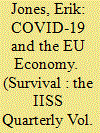

|
|
|
|
|
| Summary/Abstract |
The problem of macroeconomic adjustment requires a political solution agreed at the European level and then sold back to national electorates
|
|
|
|
|
|
|
|
|
|
|
|
|
|
|
|
| 6 |
ID:
052653
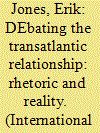

|
|
|
| 7 |
ID:
158024
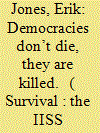

|
|
|
|
|
| Summary/Abstract |
The death of American democracy is a whodunnit, even if the crime is still in progress and the outcome is uncertain. There are many suspects, each of whom has motive, means and opportunity. Donald Trump, his allies and his enablers are at the top of the list. But populists like Trump have been around a long time, so it is also worth asking who fell asleep on the watch. There, perhaps, we should point a finger at political parties – democracy’s gatekeepers. Somehow the Republican Party seems to have lost that critical function. As we look more closely at who did what and when, we uncover a gallery of rogues stretching back to the Nixon administration (if not earlier) who conspired to bend political institutions to their own designs. If Republicans let a few populists like Trump in through the back door, that was more by self-distraction than intent.
|
|
|
|
|
|
|
|
|
|
|
|
|
|
|
|
| 8 |
ID:
185634
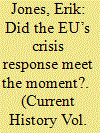

|
|
|
|
|
| Summary/Abstract |
In contrast with their halting response to the global financial crisis a decade ago, European policymakers acted quickly to mitigate the economic damage from the COVID-19 pandemic. They eased the way for governments to run deficits and increase their debt loads. In a breakthrough, the European Union agreed to a plan for common borrowing for a pandemic recovery fund. Although controversial in some countries, common debt would make it easier to address inequities among member states. But the plan was nearly derailed by objections from Poland and Hungary to a provision that would withhold funds from member states that violate the rule of law and other democratic norms, raising doubts about how transformative the borrowing precedent would prove to be.
|
|
|
|
|
|
|
|
|
|
|
|
|
|
|
|
| 9 |
ID:
141114
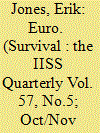

|
|
|
|
|
| Summary/Abstract |
Europe’s monetary union changed fundamentally on 10 July 2015, when German Finance Minister Wolfgang Schäuble tabled a proposal for Greece to leave the euro, temporarily, while it sorted out its public finances and other related economic reforms.1 Until that moment, Europe’s monetary union had been a system of irreversibly fixed exchange rates. Once this proposal was made – by the powerful finance minister of the only country capable of carrying out the threat – membership of Europe’s fixed-exchange-rate regime became conditional. The euro is still a shared multinational currency with a common European Central Bank (ECB), and the European Union (EU) retains its institutions for coordinating macroeconomic policy across the eurozone. Nevertheless, the shift from ‘irreversible’ to ‘conditional’ was important.
|
|
|
|
|
|
|
|
|
|
|
|
|
|
|
|
| 10 |
ID:
120489
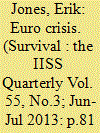

|
|
|
|
|
| Publication |
2013.
|
| Summary/Abstract |
The European Central Bank will do whatever it takes to preserve the euro, but it will also act only within its mandate. And that may not be enough.
|
|
|
|
|
|
|
|
|
|
|
|
|
|
|
|
| 11 |
ID:
128841


|
|
|
|
|
| Publication |
2014.
|
| Summary/Abstract |
Germany's highest court stopped short of ruling the European Central Bank's programme to support the euro illegal. Now the European Court of Justice must find a way to make the programme acceptable without making it ineffective.
|
|
|
|
|
|
|
|
|
|
|
|
|
|
|
|
| 12 |
ID:
165036
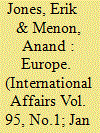

|
|
|
|
|
| Summary/Abstract |
European political development since the Treaty of Versailles has gone through four phases. The interwar period was a time of democratic weakness and ethnic conflict that culminated in the Second World War. What followed was a period of division and yet also integration, particularly in western Europe. Western Europeans sought to transcend the nation-state through the promotion of the rule of law. The end of the Cold War suggested the victory of this civilizing mission, but that suggestion was not entirely convincing—not because of the re-emergence of ethnic conflict, but because of the increasing tension between popular and representative democracy. The economic and financial crisis brought that tension to the surface and placed a great strain on the wider integration project. The challenge is how to interpret this arc in the narrative of European history. Was unification always a dream while division remains a reality?
|
|
|
|
|
|
|
|
|
|
|
|
|
|
|
|
| 13 |
ID:
018751
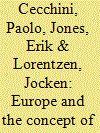

|
|
|
|
|
| Publication |
2001.
|
| Description |
p155-166
|
|
|
|
|
|
|
|
|
|
|
|
|
|
|
|
| 14 |
ID:
110963
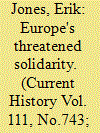

|
|
|
|
|
| Publication |
2012.
|
| Summary/Abstract |
Left unchecked, the current crisis could reshape almost everything from money and finance to security and defense, and from welfare state institutions to immigration policy.
|
|
|
|
|
|
|
|
|
|
|
|
|
|
|
|
| 15 |
ID:
138179
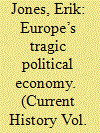

|
|
|
|
|
| Summary/Abstract |
The World Bank issued a report in January warning that the European economy is slipping toward “secular stagnation,” a prolonged period of very low inflation and very low growth. Should it come to pass, this development will have a profound impact on all aspects of the region. It will lower opportunities for each successive generation while at the same time increasing pressure on European governments to curtail the welfare state. It will make it easy for populist political movements (and political entrepreneurs) to rally opposition to traditional political parties, governing elites, and national constitutional arrangements.
|
|
|
|
|
|
|
|
|
|
|
|
|
|
|
|
| 16 |
ID:
148682
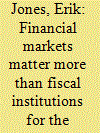

|
|
|
|
|
| Summary/Abstract |
Many argue that the euro is handicapped as a currency because European governments are unwilling to pool responsibility for fiscal policy in common institutions. This argument is derived from the theory of optimum currency areas and fuelled by analogy with US experience. It is mistaken. A monetary union does not need a fiscal union to work. Worse, efforts to build European fiscal institutions are likely to distract European policymakers from a more important agenda. Europe needs a fully functioning banking union with a common risk-free asset if Europeans want to stabilise the euro as a common currency. Moreover, it would need these things even if the euro did not exist and all it had was the common market. Financial stability – and not fiscal federalism – is the key to Europe's future. European policymakers should focus their efforts on building the necessary institutions.
|
|
|
|
|
|
|
|
|
|
|
|
|
|
|
|
| 17 |
ID:
162722
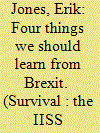

|
|
|
|
|
| Summary/Abstract |
The British people are paying a high price to serve as a case study.
|
|
|
|
|
|
|
|
|
|
|
|
|
|
|
|
| 18 |
ID:
156307
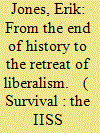

|
|
|
|
|
| Summary/Abstract |
When the Berlin Wall fell in November 1989, Edward Luce and his college friends drove to Berlin from Oxford to take part in the massive party that ushered in the end of communism. The communist world had been under strain at least since the imposition of martial law in Poland in 1981; the process accelerated rapidly when first Poland and then Hungary began to experiment with power-sharing arrangements. But the fall of the wall was the only event offering an excuse for a college-age kid to celebrate the sea change in history. Luce took advantage of the opportunity in the belief that a post-communist world would be much better than the one it replaced. His college tutors tolerantly accepted the reason for his absence upon his return.
|
|
|
|
|
|
|
|
|
|
|
|
|
|
|
|
| 19 |
ID:
094597
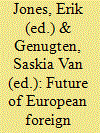

|
|
|
|
|
| Publication |
London, Routledge, 2009.
|
| Description |
199p.
|
| Standard Number |
9780415478717
|
|
|
|
|
|
|
|
|
|
|
|
Copies: C:1/I:0,R:0,Q:0
Circulation
| Accession# | Call# | Current Location | Status | Policy | Location |
| 054852 | 327.4/JON 054852 | Main | On Shelf | General | |
|
|
|
|
| 20 |
ID:
119496
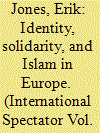

|
|
|
|
|
| Publication |
2013.
|
| Summary/Abstract |
Populists argue that Islamic immigrants are fundamentally different from Europeans. As evidence, they point to notions of religious and cultural identity. Such arguments have popular resonance. As more mainstream politicians pick up on these themes, they begin to take on an air of common sense. Nevertheless, they are mistaken. Europe has a long track record of reconciling competing identities. This has happened by focusing on patterns of interaction (solidarity) rather than obvious indicators of distinctiveness. Using the examples of the Netherlands and Turkey, this article illustrates the wide spectrum of European approaches to the challenge of getting different groups to share the same geographic space.
|
|
|
|
|
|
|
|
|
|
|
|
|
|
|
|